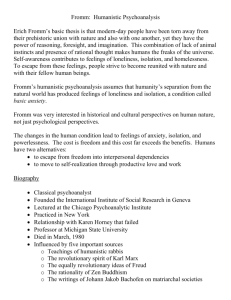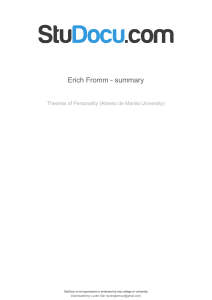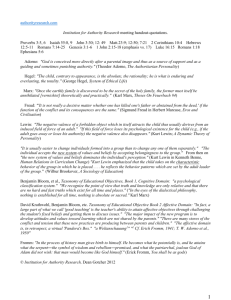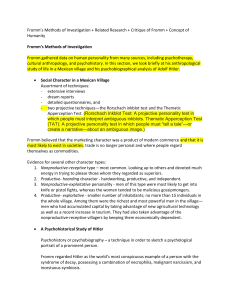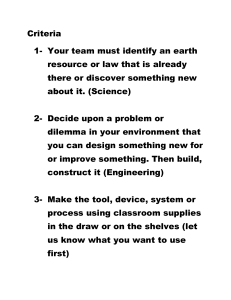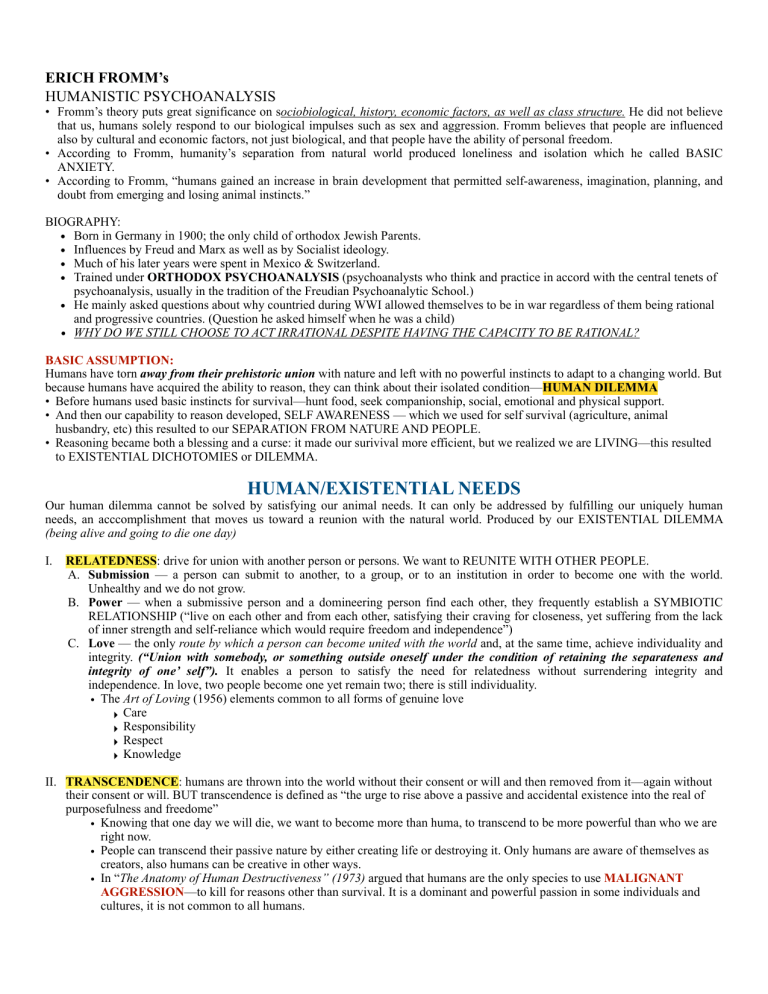
ERICH FROMM’s HUMANISTIC PSYCHOANALYSIS • Fromm’s theory puts great significance on sociobiological, history, economic factors, as well as class structure. He did not believe that us, humans solely respond to our biological impulses such as sex and aggression. Fromm believes that people are influenced also by cultural and economic factors, not just biological, and that people have the ability of personal freedom. • According to Fromm, humanity’s separation from natural world produced loneliness and isolation which he called BASIC ANXIETY. • According to Fromm, “humans gained an increase in brain development that permitted self-awareness, imagination, planning, and doubt from emerging and losing animal instincts.” BIOGRAPHY: • Born in Germany in 1900; the only child of orthodox Jewish Parents. • Influences by Freud and Marx as well as by Socialist ideology. • Much of his later years were spent in Mexico & Switzerland. • Trained under ORTHODOX PSYCHOANALYSIS (psychoanalysts who think and practice in accord with the central tenets of psychoanalysis, usually in the tradition of the Freudian Psychoanalytic School.) • He mainly asked questions about why countried during WWI allowed themselves to be in war regardless of them being rational and progressive countries. (Question he asked himself when he was a child) • WHY DO WE STILL CHOOSE TO ACT IRRATIONAL DESPITE HAVING THE CAPACITY TO BE RATIONAL? BASIC ASSUMPTION: Humans have torn away from their prehistoric union with nature and left with no powerful instincts to adapt to a changing world. But because humans have acquired the ability to reason, they can think about their isolated condition—HUMAN DILEMMA • Before humans used basic instincts for survival—hunt food, seek companionship, social, emotional and physical support. • And then our capability to reason developed, SELF AWARENESS — which we used for self survival (agriculture, animal husbandry, etc) this resulted to our SEPARATION FROM NATURE AND PEOPLE. • Reasoning became both a blessing and a curse: it made our surivival more efficient, but we realized we are LIVING—this resulted to EXISTENTIAL DICHOTOMIES or DILEMMA. HUMAN/EXISTENTIAL NEEDS Our human dilemma cannot be solved by satisfying our animal needs. It can only be addressed by fulfilling our uniquely human needs, an acccomplishment that moves us toward a reunion with the natural world. Produced by our EXISTENTIAL DILEMMA (being alive and going to die one day) I. RELATEDNESS: drive for union with another person or persons. We want to REUNITE WITH OTHER PEOPLE. A. Submission — a person can submit to another, to a group, or to an institution in order to become one with the world. Unhealthy and we do not grow. B. Power — when a submissive person and a domineering person find each other, they frequently establish a SYMBIOTIC RELATIONSHIP (“live on each other and from each other, satisfying their craving for closeness, yet suffering from the lack of inner strength and self-reliance which would require freedom and independence”) C. Love — the only route by which a person can become united with the world and, at the same time, achieve individuality and integrity. (“Union with somebody, or something outside oneself under the condition of retaining the separateness and integrity of one’ self”). It enables a person to satisfy the need for relatedness without surrendering integrity and independence. In love, two people become one yet remain two; there is still individuality. • The Art of Loving (1956) elements common to all forms of genuine love ‣ Care ‣ Responsibility ‣ Respect ‣ Knowledge II. TRANSCENDENCE: humans are thrown into the world without their consent or will and then removed from it—again without their consent or will. BUT transcendence is defined as “the urge to rise above a passive and accidental existence into the real of purposefulness and freedome” • Knowing that one day we will die, we want to become more than huma, to transcend to be more powerful than who we are right now. • People can transcend their passive nature by either creating life or destroying it. Only humans are aware of themselves as creators, also humans can be creative in other ways. • In “The Anatomy of Human Destructiveness” (1973) argued that humans are the only species to use MALIGNANT AGGRESSION—to kill for reasons other than survival. It is a dominant and powerful passion in some individuals and cultures, it is not common to all humans. • NEUROTIC INDIVIDUALS: they tend to “FLATTEN” other people. HEALTHY INDIVIDUALS: they create stuff literally or ideally. Creating or contributing to something bigger than ourselves will allow us to become more than who we are right now. III. ROOTEDNESS: the need to establish roots or to feel at home again in the world. A. Productive Strategy—people are weaned from the orbit of their mother and become fully born, that is they actively and creatively relate to the world and become whole. B. Nonreproductive Strategy (FIXATION)—a tenacious reluctance to move beyond the protective security provuded by one’s mother. “Afraid to take the next step of birth, to be weaned from mother’s breast… have a deep craving to be mothered, nursed, protected by a motherly figure; they are the externally dependent ones, who are frightened and insecure when motherly protection is withdrawn” • Incestuous feelings are based in “the deep-seated craving to remain in, or to return to, the all-enveloping womb, or to the all-nourishing breasts.” Fromm was influenced by JOHANN JAKOB BACHOFEN who belived that societies were matriarcal. It is evident of Fromm’s preference for Bachofen’s mother-centered theory of the Oedipal situation with his prefernce into older women. • Frieda Fromm-Reichmann (first wife) = 10 years older • Karen Horney (long time lover) = 15 years IV. SENSE OF IDENTITY: the capacity to be aware of ourselves as a separate entity. Because we have been torn away from nature, we need to form a concept of our self, to be able to say “I am I.” Primitive people identified more closely with their clan and did not see themsevels as individuals existing apart from their group. • HEALTHY INDIVIDUALS: make your OWN identity (by not making too trendy, “healthy people also have social identity but they also have strong individual identity forged using their own experiences”) V. FRAME OF ORIENTATION: being split off from nature, humans need a road map a frame of orientation to make their way through the world. It enebales people to organize the various stimuli that impinge on them. Almost the same as ADLER’s concept of FINAL GOAL (rational or irrational) A. Solid Frame of Orientation—can make sense of these events and phenomena; needs to be something related to contributing to society. Having your own PHILOSOPHY IN LIFE. B. Lack Reliable Frame of Orientation—strive to put these events into some sort of framework in order to make snese of them. • A road map without a goal or destination is worthless. Humans have the mental capacity to imagine alternative paths to follow. To kee from going insane, however they need a final goal or “OBJECT OF DEVOTION”—this goal focuses people’s energy in a single direction enables us to trasncent our isolated existence and confers meaning to their lives. SUMMARY These needs have evolved from human existence as a separate species and are aimed at moving people twoward a reunion with the natural world. People are strongly driven to fulfill them in some way or another, either positively or negatively. THE BURDEN OF FREEDOM • Humans are the FREAKS OF THE UNIVERSE (only animal possessing self-awareness); FREEDOM ENTAILS RESPONSIBILITY • More political freedom = more isolation from others and from the world and to feel free from the security of a permanent place in the world. As a result freedom becomes a burded and people experience BASIC ANXIETY or a feeling of being alone in the world. • For example, during the Middle Ages people had relatively little personal freedom. They were anchored to prescribed roles in society, roles that provided security, dependability, and certainty. Then, as they acquired more freedom to move both socially and geographically, they found that they were free from the security of a fixed position in the world. They were no longer tied to one geographic region, one social order, or one occupation. They became separated from their roots and isolated from one another. MECHANISMS OF ESCAPE Basic anxiety produces a frightening sense of isolation and alonness, people attempt to flee from freedom. 1. AUTHORITARIANISM: tendency to give up one’s independence and to unite with a powerful partner. “tendency to give up the indepen- dence of one’s own individual self and to fuse one’s self with somebody or something outside oneself, in order to acquire the strength which the individual is lacking” • Masochism—from basic feelings of powerlessness, weakness, and inferiority and is aimed at joining the self to a more powerful person or institution. Often disguised as love or loyalty • Sadism—more neurotic and more socially harmful. Like masochism, sadism is aimed at reducing basic anxiety through achieving unity with another person or persons. ‣ The first is the need to make others dependent on oneself and to gain power over those who are weak ‣ The second is the compulsion to exploit others, to take advantage of them, and to use them for one’s benefit or pleasure. ‣ A third sadistic tendency is the desire to see others suffer, either physically or psychologically. 2. DESTRUCTIVENESS: aimed at doing away with other people or things. rooted in the feelings of aloneness, isola- tion, and powerlessness. Unlike sadism and masochism, however, destructiveness does not depend on a continuous relationship with another person; rather, it seeks to do away with other people. 3. CONFORMITY: surrendering of one’s individuality in order to meet the wishes of others. People who conform try to escape from a sense of aloneness and isolation by giving up their individuality and becoming what- ever other people desire them to be. Thus, they become like robots, reacting pre- dictably and mechanically to the whims of others. POSITIVE FREEDOM A person “can be free and not alone, critical and yet not filled with doubts, independent and yet an integral part of mankind.” By a spontaneous and full expression of both their rational and their emotional potentialities. Positive freedom represents a successful solution to the human dilemma of being part of the natural world and yet separate from it. • Free and not alone and be a crucial part of society • Finding a Job or work that you will love. (Personal satisfaction & societal satisfaction) CHARACTER ORIENTATIONS • Personality = “the totality of inherited and acquired psychic qualities which are characteristic of one individual and which make the individual unique” • Character = “the relatively permanent system of all noninstinctual strivings through which man relates himself to the human and natural world” ASSIMILATION: people relate to the world by acquiring and using things SOCIALIZATION: relating to self and others and they can do so either nonprductively or productively. Nonproductive Orientation 1. Receptive Orientation — source of all good lies outside themselves and that the only way they can relate to the world is to receive things, including love, knowledge, and material objects. 2. Exploitative Orientation — source of good lies outside themselves, but they aggressively take what they want rather than passively receiving it. 3. Hoarding Characters — try to save what they have already obtained, inlcuding their opinions, feeling and material possessions. 4. Marketing Orientation — see themselves as commodities and value themselves agains the criterion of their ability to sell themselves. Productive Orientation Three dimensions: 1. Work — value work not as an end in itself, but as a means of creative self- expression. They do not work to exploit others, to market themselves, to withdraw from others, or to accumulate needless material possessions. 2. Love — characterized by the four qualities of love discussed earlier—care, responsibility, respect, and knowledge. BIOPHILIA (a passionate love of life and all that is alive. Biophilic people desire to further all life—the life of people, animals, plants, ideas, and cultures.) 3. Reasoning 4. Productive Love 5. Productive Thinking — Productive thinking, which cannot be separated from productive work and love, is motivated by a concerned interest in another person or object. Only through productive activity can people solve the basic human dilemma: that is, to unite with the world and with others while retaining uniqueness and individuality. Fromm believed that love of others and self-love are inseparable but that self- love must come first. All people have the capacity for productive love, but most do not achieve it because they cannot first love themselves. PERSONALITY DISORDERS Unhealthy people have nonproductive ways of working, reasoning, and especially loving 1. NECROPHILIA—the love of death and the hatred of all humanity 2. MALIGNANT NARCISSISM—belief that everything belonging to one’s self is of great value and anything beloning to others is worthless. 3. INCESTUOUS SYMBIOSIS—extreme dependence on one’s mother or mother surrogate PSYCHOTHERAPY • The goal of Fromm's psychotherapy was to work toward satisfaction of the basic human needs of relatedness, transcendence, rootedness, a sense of identity, and a frame of orientation. The therapist tries to accomplish this through shared communication in which the therapist is simply a human being rather than a scientist • His therapy encounters with patient had to be built on personal relationships since he noticed that patients usually want to resolve basic human needs such as relatedness, sense of identity, rootedness, etc. Fromm has also used dream analysis in his therapies because for him, dreams express a symbolic language which is universal although not all symbols are universal for some were just accidental. METHODS OF INVESTIGATION 1. Social Character in a Mexican Village - Fromm and his associates spent several years investigating social character in an isolated farming village in Mexico and found evidence of all the character orientations except the marketing one. 2. A Psychohistorical Study of Hitler - Fromm applied the techniques of psychohistory to study several historical people, including Adolf Hitler—the person Fromm regarded as the world's most conspicuous example of someone with the syndrome of decay, that is, necrophilia, malignant narcissism, and incestuous symbiosis. CRITIQUE OF HUMANISTIC PSYCHOANALYSIS • • • • Strength is on lucid writings on a broad range of human issues Low on ability to generate research and high o falsification Low on usefulness to the practitioner and parsimony (extreme unwillingness to spend money or use resources) High on organizing existing knowledge • • • • Humans are “FREAKS OF NATURE” they lack strong animal instincts Average on free choice, optimism, unconscious influences and uniquness Low on causality so high on teleology High on social influences. CONCEPT OF HUMANITY
